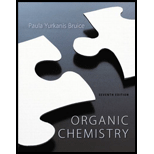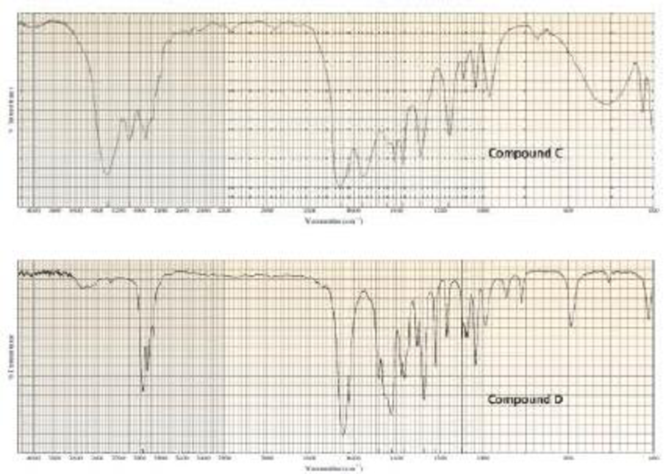
Organic Chemistry; Modified MasteringChemistry with Pearson eText -- ValuePack Access Card; Study Guide and Student Solutions Manual for Organic Chemistry, Books a la Carte Edition (7th Edition)
7th Edition
ISBN: 9780134240152
Author: Paula Yurkanis Bruice
Publisher: PEARSON
expand_more
expand_more
format_list_bulleted
Concept explainers
Textbook Question
Chapter 16, Problem 73P
Two products, A and B, are obtained from the reaction of 1-bromobutane with NH3. Compound A reacts with acetyl chloride to form C, and compound B reacts with acetyl chloride to form D. The IR spectra of C and D are shown. Identify A, B, C, and D.

Expert Solution & Answer
Want to see the full answer?
Check out a sample textbook solution
Students have asked these similar questions
2. Please fill in missing reactants, reagents, reaction conditions, or products in the
provided blank boxes
OMe
...-CF2-CF2-CF2-CF2-CF2-...
Don't used hand raiting and don't used Ai solution
I don't understand what to put for final step. Does that just mean termination? And would a radical form when I add bromine to ch2 between the rings?
Chapter 16 Solutions
Organic Chemistry; Modified MasteringChemistry with Pearson eText -- ValuePack Access Card; Study Guide and Student Solutions Manual for Organic Chemistry, Books a la Carte Edition (7th Edition)
Ch. 16.1 - The aromas of many flowers and fruits are due to...Ch. 16.1 - Prob. 2PCh. 16.1 - Name the following:Ch. 16.1 - Prob. 4PCh. 16.2 - Prob. 5PCh. 16.2 - Which is longer, the carbon-oxygen single bond in...Ch. 16.2 - There are three carbon-oxygen bonds in methyl...Ch. 16.2 - Prob. 8PCh. 16.4 - Prob. 9PCh. 16.4 - Prob. 10P
Ch. 16.5 - a. What is the product of the reaction of acetyl...Ch. 16.6 - a. Which compound has the stretching vibration for...Ch. 16.6 - Using the pKa values listed in Table 15.1, predict...Ch. 16.6 - Is the following statement true or false? If the...Ch. 16.7 - What is the product of an acyl substitution...Ch. 16.8 - PROBLEM 16
Starting with acetyl chloride, what...Ch. 16.8 - Prob. 18PCh. 16.9 - We saw that it is necessary to use excess amine in...Ch. 16.9 - Prob. 20PCh. 16.9 - a. state three factors that cause the uncatalyzed...Ch. 16.10 - Prob. 23PCh. 16.10 - Using the mechanism for the acid-catalyzed...Ch. 16.10 - Prob. 25PCh. 16.10 - Prob. 27PCh. 16.10 - Write the mechanism for the acid-catalyzed...Ch. 16.10 - Write the mechanism for the acid-catalyzed...Ch. 16.11 - Prob. 30PCh. 16.12 - Prob. 31PCh. 16.12 - Prob. 32PCh. 16.13 - Prob. 34PCh. 16.13 - Which has a higher melting point, glyceryl...Ch. 16.13 - Draw the structure of an optically inactive fat...Ch. 16.13 - Draw the structure of an optically active fat...Ch. 16.14 - Show how each of the following esters could he...Ch. 16.14 - Prob. 39PCh. 16.15 - Prob. 40PCh. 16.15 - Which of the following reactions leads to the...Ch. 16.16 - Prob. 42PCh. 16.16 - Prob. 43PCh. 16.18 - Prob. 44PCh. 16.18 - Prob. 45PCh. 16.19 - Prob. 46PCh. 16.19 - Which alkyl halides from the carboxylic acids...Ch. 16.20 - Prob. 49PCh. 16.20 - Prob. 50PCh. 16.20 - Prob. 51PCh. 16.21 - Prob. 52PCh. 16.21 - Prob. 53PCh. 16.22 - How could you synthesize the following compounds...Ch. 16 - Prob. 55PCh. 16 - Name the following:Ch. 16 - Prob. 57PCh. 16 - What compound are obtained from the fallowing...Ch. 16 - a. Rank the following esters in order of...Ch. 16 - Because bromocyclohexane is a secondary alkyl...Ch. 16 - a. Which compound would you expect to have a...Ch. 16 - How could you use 1H NMR spectroscopy to...Ch. 16 - Prob. 63PCh. 16 - a. When a carboxylic acid is dissolved in...Ch. 16 - Rank the following compounds in order of...Ch. 16 - Prob. 66PCh. 16 - Prob. 67PCh. 16 - Prob. 68PCh. 16 - A compound with molecular formula C5H10O2 gives...Ch. 16 - Prob. 70PCh. 16 - Prob. 71PCh. 16 - Prob. 72PCh. 16 - Two products, A and B, are obtained from the...Ch. 16 - Prob. 74PCh. 16 - Prob. 75PCh. 16 - Prob. 76PCh. 16 - Prob. 77PCh. 16 - When treated with an equivalent of methanol,...Ch. 16 - a. Identify the two products obtained from the...Ch. 16 - Prob. 80PCh. 16 - Identity the major and minor products of the...Ch. 16 - Prob. 82PCh. 16 - When a compound with molecular formula C11H14O2...Ch. 16 - Prob. 84PCh. 16 - Prob. 85PCh. 16 - The 1H NMR spectra for two esters with molecular...Ch. 16 - Show how the following compounds could be prepared...Ch. 16 - Prob. 88PCh. 16 - Prob. 89PCh. 16 - Prob. 90PCh. 16 - The intermediate shown here is formed during the...Ch. 16 - Prob. 92PCh. 16 - Propose a mechanism that accounts for the...Ch. 16 - Catalytic antibodies catalyze a reaction by...Ch. 16 - Prob. 95P
Knowledge Booster
Learn more about
Need a deep-dive on the concept behind this application? Look no further. Learn more about this topic, chemistry and related others by exploring similar questions and additional content below.Similar questions
- H2SO4 (cat.), H₂O 100 °C NH₂arrow_forwardX Draw the major products of the elimination reaction below. If elimination would not occur at a significant rate, check the box under the drawing area instead. ది www. Cl + OH Elimination will not occur at a significant rate. Click and drag to start drawing a structure.arrow_forwardNonearrow_forward
- 1A H 2A Li Be Use the References to access important values if needed for this question. 8A 3A 4A 5A 6A 7A He B C N O F Ne Na Mg 3B 4B 5B 6B 7B 8B-1B 2B Al Si P 1B 2B Al Si P S Cl Ar K Ca Sc Ti V Cr Mn Fe Co Ni Cu Zn Ga Ge As Se Br Kr Rb Sr Y Zr Nb Mo Tc Ru Rh Pd Ag Cd In Sn Sb Te I Xe * Cs Ba La Hf Ta W Re Os Ir Pt Au Hg Tl Pb Bi Po At Rn Fr Ra Ac Rf Ha ****** Ce Pr Nd Pm Sm Eu Gd Tb Dy Ho Er Tm Yb Lu Th Pa U Np Pu Am Cm Bk Cf Es Fm Md No Lr Analyze the following reaction by looking at the electron configurations given below each box. Put a number and a symbol in each box to show the number and kind of the corresponding atom or ion. Use the smallest integers possible. cation anion + + Shell 1: 2 Shell 2: 8 Shell 3: 1 Shell 1 : 2 Shell 2 : 6 Shell 1 : 2 Shell 2: 8 Shell 1: 2 Shell 2: 8arrow_forwardNonearrow_forwardIV. Show the detailed synthesis strategy for the following compounds. a. CH3CH2CH2CH2Br CH3CH2CCH2CH2CH3arrow_forward
- Do the electrons on the OH participate in resonance with the ring through a p orbital? How many pi electrons are in the ring, 4 (from the two double bonds) or 6 (including the electrons on the O)?arrow_forwardPredict and draw the product of the following organic reaction:arrow_forwardNonearrow_forward
arrow_back_ios
SEE MORE QUESTIONS
arrow_forward_ios
Recommended textbooks for you

 Organic ChemistryChemistryISBN:9781305580350Author:William H. Brown, Brent L. Iverson, Eric Anslyn, Christopher S. FootePublisher:Cengage Learning
Organic ChemistryChemistryISBN:9781305580350Author:William H. Brown, Brent L. Iverson, Eric Anslyn, Christopher S. FootePublisher:Cengage Learning


Organic Chemistry
Chemistry
ISBN:9781305580350
Author:William H. Brown, Brent L. Iverson, Eric Anslyn, Christopher S. Foote
Publisher:Cengage Learning
IR Spectroscopy; Author: Professor Dave Explains;https://www.youtube.com/watch?v=_TmevMf-Zgs;License: Standard YouTube License, CC-BY